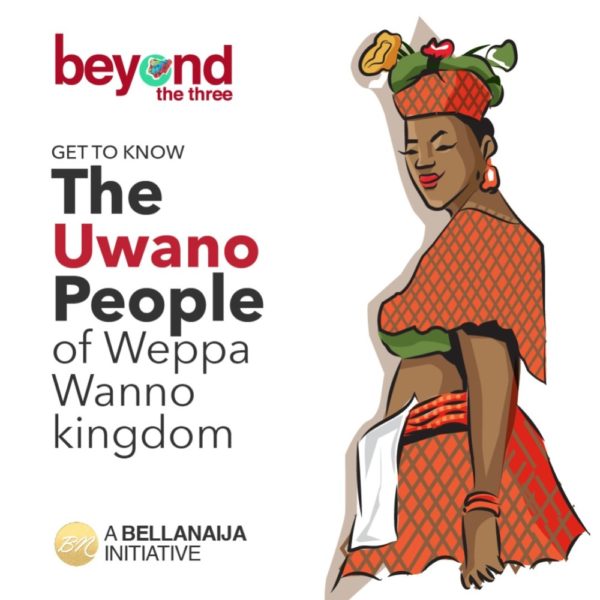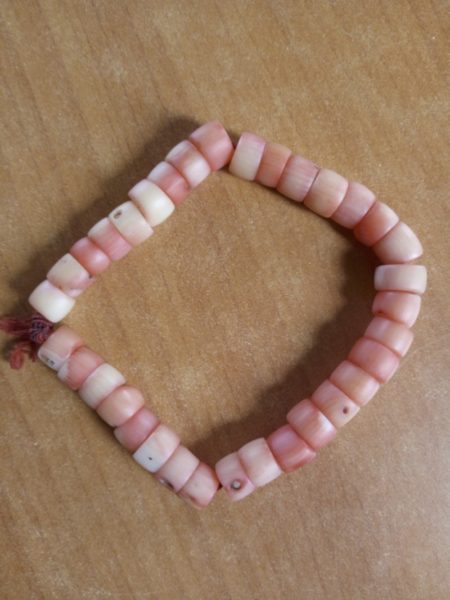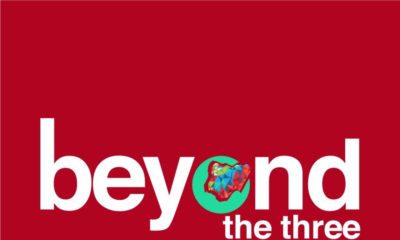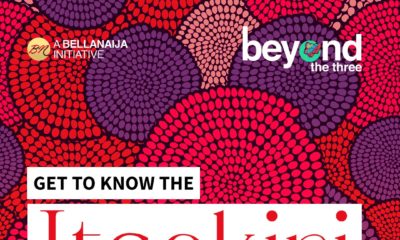Features
BN Presents Beyond the Three: Emike’s Exposition of the Uwano People is a Must Read
 Beyond The Three is a new series on BellaNaija where we celebrate and spotlight every tribe and ethnic group that is NOT Yoruba, Hausa or Igbo. We invite ALL BellaNaijarians to be a part of this initiative.
Beyond The Three is a new series on BellaNaija where we celebrate and spotlight every tribe and ethnic group that is NOT Yoruba, Hausa or Igbo. We invite ALL BellaNaijarians to be a part of this initiative.
In the first edition of this series, we were introduced to the Idoma people; this was followed by the Esan people. Joan introduced us to the Oegorok people and we learned about the Mhiships from Mwanret. Last week, Ma’ade told us about the Bassa people. Today, we’re going down south to discover the Uwano people of the Weppa Wanno kingdom.
Shout out to Emike who chose to tell the story of her people in a different way! We’re always here for a fresh stylistic approach.
***
Apemah vha mooh! Can words actually do justice to this unique people of Weppa Wanno Kingdom? I doubt much, but read on. I do not bear an English name as my father believes we are not English and he was miffed that his own father did not give him a native name. Imagine a Weppa Wanno man named Okolo. What traditional man does that? My grandfather obviously.
Emike means my heart’s desire, Ebokhasomi -how successful it should be, Omoayena – you live for the child. These are great names, if I dare say so myself.
Weppa Wanno is home to the Uwano people of Etsako East local government area of Edo state. This kingdom is a merger of the Weppa and Wanno clans. It consists of several towns and villages: Ivioghe, Igiode, Iviebua, Agiere, and Ivianokpodi, to name a few. Agenebode serves as the headquarters.
My hometown is Ivioghe and I have been there several times. It really does come alive during the festive periods like Christmas, Easter, burial ceremonies etc. Otherwise it is quiet. My dialect is known as Uwano, and yes I speak it fluently. There is a kind of joy I get when it is spoken. Minority tribes in Nigeria would totally get this. Growing up in Jos, it was quite hard to come across Weppa Wanno people, so my dad made it compulsory to speak the native dialect at home. It was very tough, but it worked so well. Looking back now I am so grateful for the effort he put into making us learn our language. I feel learning how to speak one’s native tongue is a way to preserve the culture.
We have a wide array of foods:
Omisagwe (groundnut soup) picture it with a little bitterleaf ,cow tongue, goat meat and other protein assortments, now I feel so hungry and homesick.
Okotikpoi (lumpy egusi soup), any occasion without it is not an occasion at all, it is that serious.
Omi Ukpoka (corn meal soup), Omi Uvhavha, Omi Isamhaguah, Omi Ikpeh, Omi Ese ogbomi (fresh fish soup),Omi Irherhe, Omi Atsanifah and Ugbawenwen.
The soups are eaten with pounded yam, fufu or eba and washed down with palm wine if available. I bet Uwano people reading this would be salivating. I could go on and on about the food, but I do have to showcase other parts of my culture, so let’s continue.
There are so many unique cultures that set Weppa Wanno people apart; hopefully this space can do justice to a fraction of them. A typical Weppa-Wanno woman wears two George wrappers, a blouse and a scarf. The whole outfit is polished off with her Ivie (coral beads)

Ivie
The males wear the George wrapper across their chest. The ruling class comes from Agiere in Weppa and Eggoh/Ivioghe in Wanno.
The traditional head is known as the Okumagbe translated as the “unifier” of Weppa Wanno and rotates around the ruling classes.
The unique and colourful akhe (cooking) is a 2-part ceremony: Akhe ceremony and the Ukweh mhi akhe ceremony. For the first part, females from the land who are married to Weppa-Wanno men are mandated to carry out this ceremony during their lifetime. If she was unable to do it and she passes on, her offspring would be unable to do theirs, until they have done hers posthumously. Pretty strange right? But that is tradition. Basically the ceremony involves the woman cooking for all her invited guests and the village in general. She does not do this alone; she has helpers and it’s done according to the financial capability of her husband. After performing this rite, she earns the title” One kha kha (great cook of nations).
If a woman gets married to a man from a different tribe she is not compelled to complete this rite. If a man marries a woman from a different tribe, she is also not compelled to do so. For a female who has older sisters that have not performed this traditional rite (when she is ready to do hers) she would have to combine theirs with hers. The second part of the ceremony takes place later in the year around August or September. All the Wanno women that carried out their Akhe ceremony within the year gather at the Agenebode market. They wear a native hand-woven wrapper, Igbogane on their chest with Idibie tattoos on their bodies, Asamha, an elephant’s tusk on her legs. They also wear beads on their waists and head. There is a very colourful procession, where they move like queens with their entourage with umbrellas held over their heads to protect them from the elements of the weather. This is a compulsory conclusion to the first part of the ceremony.
Wedding ceremonies are very beautiful. For an Amoyah -female first born, her bride price is 500naira 7kobo, and for an Adegbe -female second born, 300naira 7kobo. Dear future husband, I am an Amoyah but do not fret, we would find a way to get 7kobo. Adegbe females have equal rights with men and can therefore inherit their father’s properties. An Amoyah’s marriage ceremony is usually done on ewoh noh kwah i.e. a day to market day while an Adegbe’s own is done on a market day.
The bride ties a George wrapper across her chest and is heavily adorned with ivie on her head, neck, arms and ears. The ceremony is mostly done in the evenings. The morning after, the bride’s parents carry food items: basin of agidi, basin of plantains, bananas and coconuts to their daughter in her husband’s house. After 7 days, the bride’s parents will still carry soup ingredients and yams to their daughter, but nowadays, they carry breakfast beverages and a basin full of bread.
The funeral ceremonies are a sight to behold and very entertaining. The likes of Waziri, Ugabi, and Young Bolivia to name a few bring their unique tunes to every occasion. As I write this, I am steadily moving to their rhythm in my head. The dance steps are so unique but let me try to describe it. Imagine someone bending a bit low and moving their legs backwards, funny I know and I am sure you are trying it out now. The size of the ceremony depends on the age of the deceased and the financial power of the deceased family. It is generally believed that an old person has lived a rich and full life and the funeral is actually a celebration of life. The funeral ceremony is a three day event.
For the wake keep, the body is brought to the deceased home to lie in state amidst pomp and pageantry. I remember my grandfather’s ceremony.We had a very lively and colourful procession from the funeral home down to his house. Family and friends gather at the deceased’s compound. The deceased’s children according to their age and marital status are called upon to pay certain amounts of money and drinks to the village and neighbouring villages. Each child comes out with their well wishers to dance to tunes belted out by the invited musician(s). Guests are entertained with food and drinks. It was a norm for the wake keep to continue throughout the night until the wee hours of the morning but this has been abolished in Ivioghe. Currently, all wake keeps have a curfew of 6pm.A good step in my own opinion.
The deceased is laid to rest based on their own religious belief, the day after the wake keep. Entertainment of guest follows afterward. Again if the family is well to do they invite one of the super star musicians. On the third day, ukpemhi and uthughiemhi are traditional rites done for males and adegbe females. Ukpemhi involves going to ukhue – village square where masquerades of different kinds perform with the family dancing and carrying pictures of the deceased. Uthughiemhi is for sharing souvenirs and this is done by the children, grand children and other relatives. As a sign of respect, the children of the deceased are expected to shave off all their hair, but can opt out by paying a fine.
The age group (okhe) traditional rite is only for males either old or young. Male children of Adegbe mothers carry out this rite while their fathers are still alive whereas those of the Amoyah do theirs only when their fathers are late. This puts male children of an Adegbe in a more likely position to rule. Okhe initiation takes place over several days in caves called godo and is done by the elders of the community. Food items and other necessities are carried along. The red cap is only worn by those who have completed this rite.
How can I talk about my culture and not drop at least one proverb? Dear sons and daughters of the soil, attempt to pronounce this. Yes you can try it or better still get your parents to help you out, bet they would be proud. “Baba otonah, agwemoh ethuagba” means “father has died and you are talking of his beard”.
The most amazing attributes of my tribe are our hospitality and open-mindedness. We welcome strangers into our homes and communities, making them feel so comfortable with our delicious meals and storytelling. A typical Weppa-wanno person is so blunt and says things as they see it; no sugar coating. As amazing as we are, I am still uncomfortable about the fact that not all females inherit properties. It’s a very sad situation. Hopefully, this can be addressed and abolished.
Overall, I absolutely love my tribe and wish more people knew about us and our fascinating culture. This series is one of such avenues that aim to put the spotlight on us. Having foodies blog more about our food and how to source the ingredients; as some can be scarce would be so welcome. Who knows I just might have planted an idea in someone’s head. An app that teaches the language would go a long way in preserving it as more and more people born away from home are not so keen on learning.
My parents, Dr and Mrs Omoayena, did an amazing job in teaching us about our culture. I am still learning how to read and write in my local dialect.
It was an absolute delight writing this piece. If you know more, you can add it in the comment section. Together we can show the world more of the Weppa-Wanno people. Hopefully this article has stirred up something in you; perhaps you would want to visit. Come around during Christmas, you can thank me later.
On a final note, Apemah vha mie PVC. Lo khi ekpaboh ni mamoh. Translation: My people go and collect your PVC. It is the power we have.
Wow, Emike makes us feel like packing our bags and moving straight to Weppa-Wanno. Thank you so so much for giving us all of the feels. BellaNaijarians are awesome! We can’t thank y’all enough for being such a great community. Find out more about the series HERE. Click HERE to read more entries in the series.























